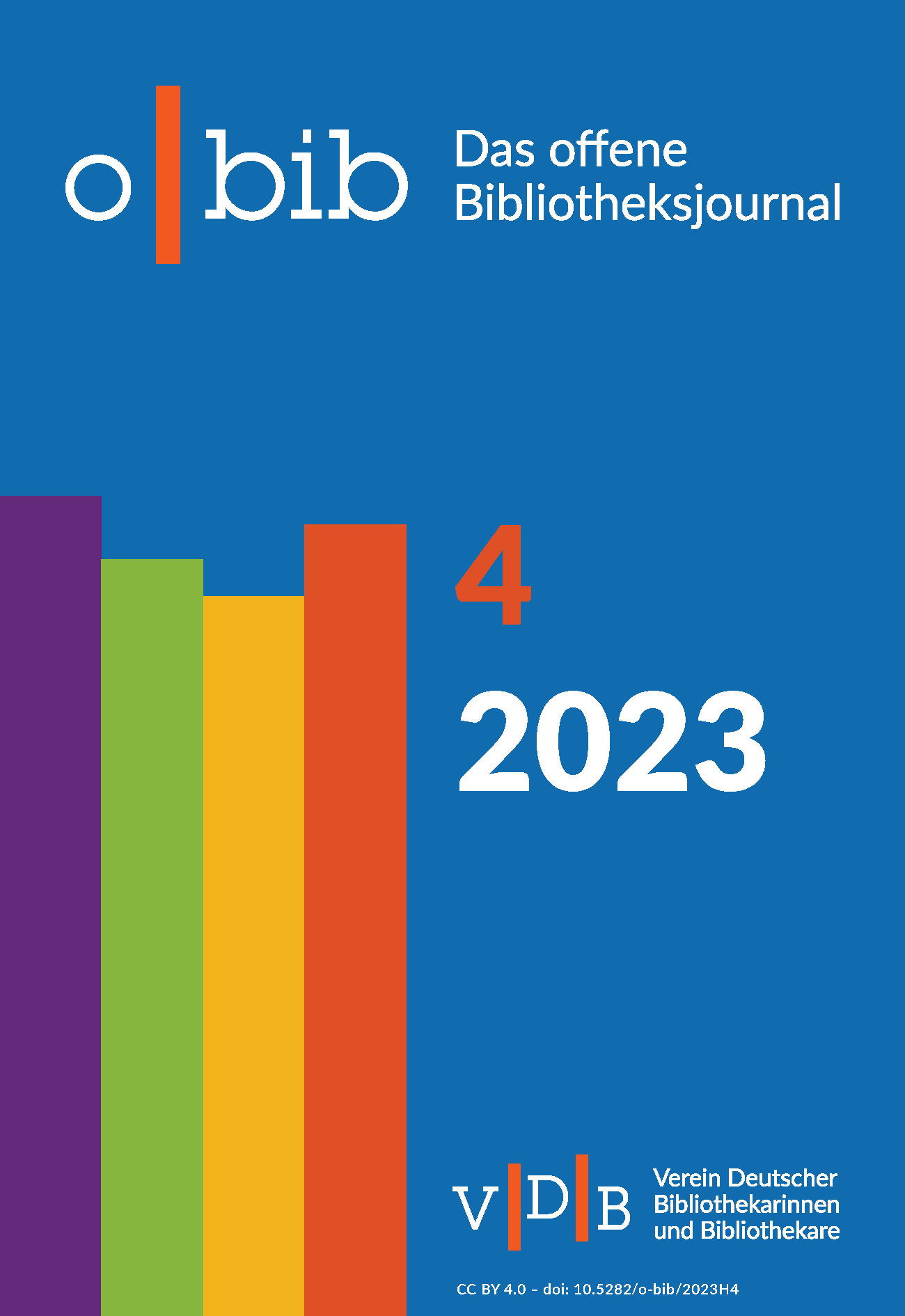Fortbildung bibliothekarischer Fachkräfte an der Hochschule Hannover
Ergebnisse einer Absolventenstudie
DOI:
https://doi.org/10.5282/o-bib/5976Keywords:
Berufsbegleitendes Studium, Offene Hochschule Niedersachsen, Fachangestellte für Medien- und Informationsdienste, FaMI, Absolvent*innenbefragung, Berufsfeld, Hochschule Hannover, Studiengang Informationsmanagement – berufsbegleitend, Fortbildung, BibliothekAbstract
For the past ten years, the extra-occupational bachelor’s degree program “Informationsmanagement – berufsbegleitend” at the Hannover University of Applied Sciences and Arts has qualified library employees – so called “Fachangestellte für Medien- und Informationsdienste“ (FaMIs) – for higher-level tasks in the library sector. The students work in public or academic libraries. They have either a university entrance qualification or they can make use of the initiative “Offene Hochschule Niedersachsen” (Open University Lower Saxony – FaMI training + at least three years of relevant professional experience). On the occasion of an upcoming study reform, the 125 graduates of the first seven years were asked in February 2023 in an online survey about their further professional growth and their retrospective assessment of the studies (response rate 93%). The results show a very high level of satisfaction with the study program and the professional career. They also give clues for adding or deepening the curriculum with topics such as human resource management and Open Science. The 116 respondents also pointed out that although they are welcome on the labour market as qualified specialists, they did not receive enough support from their employers during their studies. A third of them changed institutions after graduation.
References
Becker, Hans-Georg: Metadatenmanagement ohne Programmierkenntnisse. Ist das möglich?, in: ABI Technik 40 (2), 2020, S. 311. Online: https://doi.org/10.1515/abitech-2020-2026.
Beendigung der Fernweiterbildung Bibliothekswissenschaft, Fachhochschule Potsdam. Online: https://www.fh-potsdam.de/studium-weiterbildung/weiterbildung/weiterbildungsangebote/, Stand: 29.08.2023.
Bertram, Jutta: Informationsmanager auf dem Arbeitsmarkt. Ergebnisse einer Absolventenbefragung der Hochschule Hannover, in: Information – Wissenschaft und Praxis 68 (1), 2017, S. 47–57. Online: https://doi.org/10.1515/iwp-2017-0021.
Berufsbilder, Berufsverband Information Bibliothek e.V. (o. J.). Online: https://www.bib-info.de/ausbildung/berufsbilder/bibliothekare-bibliothekarinnen, Stand: 11.7.2023.
Dahm, Gunther; Kerst, Christian: Wie erfolgreich sind Studierende mit und ohne Abitur?, in: DZHW Brief (03), 2019. Online: https://www.dzhw.eu/pdf/pub_brief/dzhw_brief_03_2019, Stand: 04.07.2023.
Engelkenmeier, Ute; Forster, Marie-Luise; Fröhlich, Sibylle: „Irgendwas mit Zukunft“. Impulse für eine nachhaltige Aus- und Weiterbildung im Berufsfeld Bibliothek, in: Bibliothek. Forschung und Praxis 46 (3), 2022, S. 450–456. Online: https://doi.org/10.1515/bfp-2022-0033.
Frank, Stefan: Das Profil bibliothekswissenschaftlicher Studiengänge angesichts der Diversifizierung bibliothekarischer Tätigkeiten, in: Bibliothek. Forschung und Praxis 46 (3), 2022, S. 404–408. Online: https://doi.org/10.1515/bfp-2022-0031.
Herrmann, Lisa: Abbruchgründe nicht-traditioneller Studierende. Identifikation von Clustern mittels Data Mining, in: Zeitschrift für Hochschulentwicklung 17 (4), 2022, S. 133–153. Online: https://doi.org/10.3217/zfhe-17-04/07.
Heublein, Ulrich; Richter, Johanna; Schmelzer, Robert: Die Entwicklung von Studienabbruchquoten in Deutschland, in: DZHW Brief (03), 2020. Online: <https://www.dzhw.eu/pdf/pub_brief/dzhw_brief_03_2020.pdf, Stand: 28.06.2023.
Kommission Bibliotheken und Diversität, Deutscher Bibliotheksverband e.V. (o. J.). Online: https://www.bibliotheksverband.de/kommission-bibliotheken-und-diversitaet, Stand: 07.07.2023.
Meyer, Thorsten: Zukunftsperspektiven Wissenschaftliche Bibliothek 2050, in: BuB – Forum Bibliothek und Information 72 (2–3), 2020, S. 116–117. Online: https://www.b-u-b.de/fileadmin/archiv/imports/pdf_files/2020/bub_2020_02_117_118.pdf, Stand: 25.04.2023.
Mumenthaler, Rudolf: Universitätsbibliotheken im Jahre 2040, in: Bibliothek. Forschung und Praxis 47 (1), 2023, S. 33–37. Online: https://doi.org/10.1515/bfp-2022-0087.
Petersohn, Sabrina; Thiedig, Christoph: Informationsmanagerin gesucht. Die Rolle wissenschaftlicher Bibliotheken in der Forschungsberichterstattung in Deutschland, in: ABI Technik 42 (1), 2022, S. 70–77. Online: https://doi.org/10.1515/abitech-2022-0008.
Pfeffer, Magnus: No Future? Konsequenzen der Bewerberkrise der informationswissenschaftlichen Studiengänge, in: Bibliothek. Forschung und Praxis 46 (3), 2022, S. 422–430. Online: https://doi.org/10.1515/bfp-2022-0044.
Rethmann, Anne: Politische Bildung in Bibliotheken, in: Bibliothek. Forschung und Praxis 46 (2), 2022, S. 301–317. Online: https://doi.org/10.1515/bfp-2022-0010.
Rösch, Henriette: Analysieren, Prozessieren, Kommunizieren. Neue Qualifikationen und Tätigkeitsprofile für Bibliotheken im Zuge der Open-Access-Transformation, in: b.i.t. online 25 (3), 2022, S. 241–246. Online: https://www.b-i-t-online.de/heft/2022-03-fachbeitrag-roesch.pdf, Stand: 25.04.2023.
Rösch, Hermann: Informationsethik und Bibliotheksethik. Grundlagen und Praxis, Berlin; Boston 2021 (Bibliotheks- und Informationspraxis 42). Online: https://doi.org/10.1515/978.
Schade, Frauke: Fit für die Zukunft. Anforderungen einer neuen Arbeitswelt an die bibliotheks- und informationswissenschaftliche Aus- und Weiterbildung, in: BuB – Forum Bibliothek und Information 72 (1), 2020, S. 32–35. Online: https://www.b-u-b.de/fileadmin/archiv/imports/pdf_files/2020/bub_2020_01_032_035.pdf, Stand: 25.04.2023.
Schmidt-Ruhe, Bernd: Der Fachkräftemangel als Ausdruck der Krise des Bibliothekswesens, in: Bibliothek. Forschung und Praxis 47 (3), 2022, S. 502–510. Online: https://doi.org/10.1515/bfp-2022-0047.
Schwering, Stephan: Öffentliche Bibliotheken 2040. Aspekte eines Zukunftsorts, in: Bibliothek. Forschung und Praxis 47 (1), 2023, S. 38–40. Online: https://doi.org/10.1515/bfp-2022-0072.
Seidl, Tobias; Vonhof, Cornelia: Bibliotheken 2040. Mit der Szenario-Methode über die Zukünfte von Bibliotheken nachdenken, in: Bibliothek. Forschung und Praxis 47 (1), 2023, S. 413. Online: https://doi.org/10.1515/bfp-2022-0070.
Wildeisen, Sarah: Rettung in Sicht?! Medienpädagoginnen und -pädagogen in Öffentlichen Bibliotheken, in: BuB – Forum Bibliothek und Information 72 (23), 2020, S. 118–121. Online: https://b-u-b.de/fileadmin/archiv/imports/pdf_files/2020/bub_2020_02_119_122.pdf, Stand: 09.05.2023.
Wimmer, Ulla u.a: Öffentliche Arbeitssitzung/ Alles dual oder was? Modelle für duale, kooperative, (praxis)integrierende und (berufs)begleitende Studiengänge (KIBA) (26.05.2023). Online: urn:nbn:de:0290-opus4-183151.
Wittich, Anke: Kein „Bachelor-Light“ im berufsbegleitenden Studium, in: Die neue Hochschule (05), 2021, S. 12–15.
Ziele für nachhaltige Entwicklung. Bibliotheken und ihr Beitrag zur Agenda 2030 der UN, Deutscher Bibliotheksverband e.V. (o. J.). Online: https://www.biblio2030.de/, Stand: 09.05.2023.
Downloads
Published
Issue
Section
License
Copyright (c) 2023 Jutta Bertram, Anke Wittich

This work is licensed under a Creative Commons Attribution 4.0 International License.





